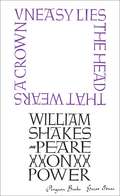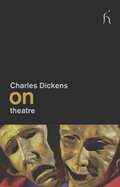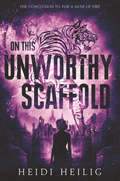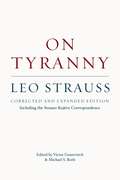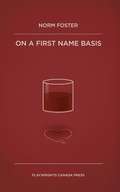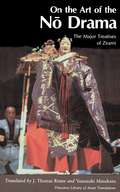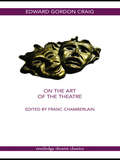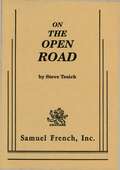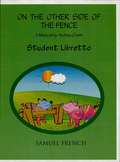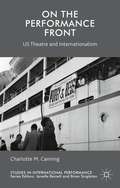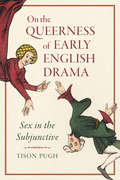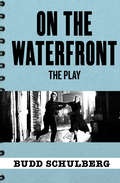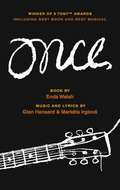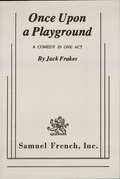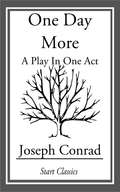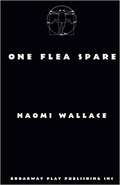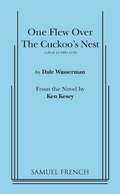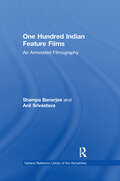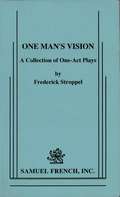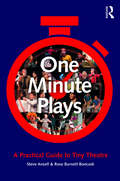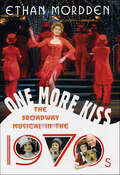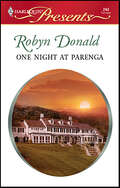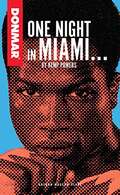- Table View
- List View
On Power
by William ShakespeareThese are Shakespeare's greatest writings on power in all its forms - in love, in war, in politics and in the family. From Macbeth's vaulting ambition to Richard II's fragile grip on authority, from the violent rivalries of King Lear to the exquisite poetry of the love sonnets, these pieces show, with philosophical subtlety and psychological acuity, how we manipulate and dominate each other.Throughout history, some books have changed the world. They have transformed the way we see ourselves - and each other. They have inspired debate, dissent, war and revolution. They have enlightened, outraged, provoked and comforted. They have enriched lives - and destroyed them. Now Penguin brings you the works of the great thinkers, pioneers, radicals and visionaries whose ideas shook civilization and helped make us who we are.
On Stage (Fountas & Pinnell LLI Red #Level Q)
by Karen BaickerMonkeying around Jayne loved being part of the class play. But a classmate's teasing just might spoil her fun. If she doesn't figure out how to stop him, she's just gonna go ape!
On Stage: Theater Games and Activities for Kids
by Lisa Bany-WintersLights, camera, play! With this second edition of On Stage: Theater Games and Activities for Kids, budding thespians will have fun under the footlights as they choose from more than 125 theater games that spark creativity, boost confidence, and encourage collaboration. They'll learn all about how to make a stage performance great with improvisational games such as Freeze, Party Quirks, the Yes Game, and Gibberish; they'll make puppets, discover makeup secrets, and design and build a set. This revised and expanded edition features 35 new improvisational games and ready-to-use monologues, scenes, and short plays. Whether playing alone or in a group, everyone can have theater fun with On Stage!
On Theatre (On Series)
by Charles Dickens Sir Richard EyreDickens' burning passion for theater has often been overlooked by fans of his novels. A keen playwright and actor, he staged performances for which he oversaw every detail, and personally adapted many of his own fictional works. As a consummate self-publicist, he also undertook numerous stage tours and public readings of his own work. For Dickens, and for large swathes of Victorian society, theatre was a way of life and a hub of community: audience and performers would swell out onto the streets and into nearby drinking establishments after each show. Drawing on a variety of sources, both fictional and journalistic, this collection portrays a career's worth of Dickens' musings, critiques, and opinions on one of his most revered passions and pastimes—the theater.
On This Unworthy Scaffold
by Heidi HeiligJetta is in the center of a war. With her magical power, she could save everyone, save her country . . . or she could destroy it all. Heidi Heilig blends traditional storytelling with ephemera for a lush, page-turning commercial fantasy for fans of Tomi Adeyemi and Leigh Bardugo. The final book in the acclaimed Shadow Players trilogy. Jetta’s home is spiraling into civil war. Le Trépas—the deadly necromancer—has used his blood magic to wrest control of the country, and Jetta has been without treatment for her malheur for weeks. Meanwhile, Jetta’s love interest, brother, and friend are intent on infiltrating the palace to stop the Boy King and find Le Trépas to put an end to the unleashed chaos. The sweeping conclusion to Heidi Heilig’s ambitious trilogy takes us to new continents, introduces us to new gods, flings us into the middle of palace riots and political intrigue, and asks searching questions about power and corruption. Acclaimed author Heidi Heilig creates a rich world inspired by Southeast Asian cultures and French colonialism. Told from Jetta’s first-person point-of-view, as well as with chapters written as play scripts and ephemera such as songs, myths, and various forms of communication, On This Unworthy Scaffold is a satisfying finale to the epic fantasy trilogy. It will thrill readers who love Claire Legrand’s Furyborn, Laini Taylor’s Strange the Dreamer, and N. K. Jemisin’s The Fifth Season.
On Tyranny: Including the Strauss-Kojève Correspondence
by Leo StraussAn analysis of the classic Greek dialogue about absolute rule and the impassioned commentary it inspired between two philosophers.On Tyranny is Leo Strauss’s classic reading of Xenophon’s dialogue Hiero, or Tyrannicus, in which the tyrant Hiero and the poet Simonides discuss the advantages and disadvantages of exercising tyranny. Included are a translation of the dialogue from its original Greek, a critique of Strauss’s commentary by the French philosopher Alexandre Kojève, and the complete correspondence between the two.This revised and expanded edition introduces important corrections throughout and expands Strauss’s restatement of his position in light of Kojève’s commentary to bring it into conformity with the text as it was originally published in France.“On Tyranny is a complex and stimulating book with its ‘parallel dialogue’ made all the more striking since both participants take such unusual, highly provocative positions and so force readers to face substantial problems in what are often wholly unfamiliar, even shocking ways.” ―History and Theory
On a First Name Basis
by Norm FosterDavid, a successful novelist with writer's block, has received some devastating news he's kept to himself. Lucy, his housekeeper of twenty-eight years, has her own secret that she's afraid to admit. As Lucy is getting ready to end her shift, David invites her to stay and have a drink, curious about the woman who's been tending to his house all these years. But as the night sets in and the drinks start to flow, secrets reveal themselves, for better or worse.
On the Art of the No Drama: The Major Treatises of Zeami (Princeton Library of Asian Translations #158)
by J. Thomas Rimer Yamazaki MasakazuThis annotated translation is the first systematic rendering into any Western language of the nine major treatises on the art of the Japanese No theater by Zeami Motokivo (1363-1443). Zeami, who transformed the No from a country entertainment into a vehicle for profound theatrical and philosophical experience, was a brilliant actor himself, and his treatises touch on every aspect of the theater of his time. His theories, mixing philosophical and practical insights, often seem strikingly contemporary. Since their discovery early in this century. these secret treatises have been considered among the most valuable and representative documents in the history of Japanese aesthetics. They discuss subjects from the art of the playwright to the reciprocal nature of the relationship between performer and audience.
On the Art of the Theatre
by Edward Gordon CraigFirst published in 1911, On the Art of the Theatre remains one of the seminal texts of theatre theory and practice. Actor, director, designer and pioneering theorist, Edward Gordon Craig was one of twentieth century theatre’s great modernisers. Here, he is eloquent and entertaining in expounding his views on the theatre; a crucial and prescient contribution that retains its relevance almost a century later. This reissue contains a wealth of new features: a specially written Introduction and notes from editor Franc Chamberlain an updated bibliography further reading. Controversial and original, On the Art of the Theatre stands as one of the most influential books on theatre of the twentieth century.
On the Open Road
by Steve TesichComic drama / 4m, 1m child, 1f child / Unit set / While fleeing a civil war, Al comes across Angel trussed up and waiting to be hung. Al is pulling a cart loaded with art treasures he has salvaged from bombed out churches and museums. He hopes to barter his way into The Land of the Free with them, but the cart has become too heavy for Al to pull. He rescues the brutish Angel to help. On the open road Al teaches Angel about literature, music and art history so that he will make a good citizen. When they reach the border, they are told they must execute a troublemaker named Jesus Christ to earn their freedom. He has been severely tortured and is catatonic, though he can still play the cello beautifully. Angel and Al are unable to do the deed so the monk in charge takes care of it and has them crucified.
On the Other Side of the Fence
by Andrea GreenMusical / On the Other Side of the Fence is a story about two farms separated by a big, strong fence. The fence was put up because of a long standing feud between Farmer Franklin and Farmer Fred. Because of their differences, they have forbidden the animals on their individual farms to have anything to do with the animals on the other side. One day over by the fence, the two pigs, Ham and Bacon, develop a special friendship. The farmers warn them that this is unacceptable, but the pigs and many of the animals wonder why this has to be. The animals look to each other for answers. Finally, out of desperation, Ham and Bacon escape their farms together. The animals on both sides of the fence are saddened by their absence and discover, in their shared concern, that they share many of the same feelings. The animals prevail upon the farmers to end their feud and make peace with one another. A vote is taken and unanimously the decision is made to ''take the fence away." The farmers begin to see each other in a new way -- the animals are jubilant -- the pigs return -- and acceptance, friendship and understanding are the result.
On the Performance Front
by Charlotte M. CanningOn the Performance Front argues that US theatre in the twentieth century embraced the theories and practices of internationalism as a way to realize a better world and as part of the strategic reform of the theatre into a national expression. Live performance, theatre internationalists argued, could represent and reflect the nation like no other endeavour. On the Performance Front focuses on US theatre's international efforts without losing sight of either the ways these efforts mirrored those in other countries or the complex, often conflicting, relationship between internationalism and nationalism.
On the Queerness of Early English Drama: Sex in the Subjunctive
by Tison PughOften viewed as theologically conservative, many theatrical works of late medieval and early Tudor England nevertheless exploited the performative nature of drama to flirt with unsanctioned expressions of desire, allowing queer identities and themes to emerge. Early plays faced vexing challenges in depicting sexuality, but modes of queerness, including queer scopophilia, queer dialogue, queer characters, and queer performances, fractured prevailing restraints. Many of these plays were produced within male homosocial environments, and thus homosociality served as a narrative precondition of their storylines. Building from these foundations, On the Queerness of Early English Drama investigates occluded depictions of sexuality in late medieval and early Tudor dramas. Tison Pugh explores a range of topics, including the unstable genders of the York Corpus Christi Plays, the morally instructive humour of excremental allegory in Mankind, the confused relationship of sodomy and chastity in John Bale’s historical interludes, and the camp artifice and queer carnival of Sir David Lyndsay’s Ane Satyre of the Thrie Estaitis. Pugh concludes with Terrence McNally’s Corpus Christi, pondering the afterlife of medieval drama and its continued utility in probing cultural constructions of gender and sexuality
On the Waterfront: The Play (Plays For Performance Ser.)
by Budd Schulberg Stan SilvermanBudd Schulberg&’s Academy Award–winning screenplay, updated as a stage drama for modern audiencesFirst performed in 1988 and again on Broadway in 1995, Budd Schulberg and Stan Silverman&’s stage version of On the Waterfront may represent the purest incarnation of his classic story. Produced forty years after the movie swept the Academy Awards, the subtly modernized stage play was a call to arms for a new generation. With this rendition, Schulberg and Silverman hoped to reach young people who seemed detached from the dehumanizing effects of poverty and the exploitation of society&’s most vulnerable. Set in the 1950s and featuring original protagonists Terry Malloy and Father Pete Barry, On the Waterfront continues to stand as a masterful and uniquely American tragedy. This ebook features an illustrated biography of Budd Schulberg including rare images and never-before-seen documents from the author&’s estate.
Once
by Enda Walsh Glen Hansard Markéta Irglová"A jewel box of a musical: small, delicate, brimming with emotion and charm."-Vogue"It may sound like heresy to fans of the 2006 film, but this bewitching stage adaptation arguably improves on the movie, expanding its emotional breadth and elevating it stylistically while remaining true to the original's raw fragility."?Hollywood ReporterRetaining the film's popular music and lyrics, acclaimed Irish playwright Enda Walsh adapts this charming tale of a complicated romance between an Irish street musician and a young Czech immigrant for the stage. A hit musical Off-Broadway, Once premiered on Broadway in spring 2012 to rave reviews.Enda Walsh is the author of five Edinburgh Festival Fringe First Award-winning plays, including Penelope, The Walworth Farce, and The New Electric Ballroom. He also co-wrote the film Hunger, which won the Camera d'Or award at the Cannes Film Festival.Glen Hansard and Markéta Irglová are the stars and songwriters of the 2006 film Once, for which they won an Academy Award for Best Song. The two comprise the musical folk-rock duo The Swell Season, which is currently touring the United States. A documentary film of the duo, The Swell Season, was an official selection of the 2011 Tribeca Film Festival. Hansard is also a member of the Irish band The Frames and Irglová is a classically trained Czech pianist and vocalist.
Once Upon A Playground
by Jack FrakesComedy / 2m, 8f / After tomboys on a playground cruelly reject a girl with a funny nose because she is different, each expresses her inner fear of being different. The girl with the funny nose discovers a boy like herself. He offers friendship, hope and illusion. This comedy portrays the cruelty of youth as a total theatre experience, blending realism with such theatrical devices like stylized movement, choral chants and expressionism.
One Day More: A Play in One Act
by Joseph ConradJoseph Conrad, born Jozef Teodor Konrad Korzeniowski, (1857-1924) was a Polish-born novelist who spent most of his adult life in Britain. He is regarded as one of the greatest English novelists, which is even more notable because he did not learn to speak English well until he was in his 20s. He is recognized as a master prose stylist. Some of his works have a strain of romanticism, but more importantly he is recognized as an important forerunner of modernist literature. His narrative style and anti-heroic characters have influenced many writers, including Ernest Hemingway, D.H. Lawrence and Graham Greene. Writing during the apogee of the British Empire, Conrad drew upon his experiences in the British Merchant Navy to create novels and short stories that reflected aspects of a world-wide empire while also plumbing the depths of the human soul. Amongst his best known works are Heart of Darkness (1899), Lord Jim (1900), Under Western Eyes (1911), Victory (1915) and The Rescue (1920).
One Flea Spare
by Naomi Wallace“I sat in a theater at the Humana Festival last year, after the closing monologue of ONE FLEA SPARE, unable to move. I had known Naomi Wallace’s work well, having directed an earlier play, and I knew she had tremendous talent and promised to great things. Nothing had prepared me—not my admiration for her plays and for her beautiful, harsh, moving, brilliantly political poetry—for the experience of watching this play, which is in my opinion one of the finest works of dramatic literature written here or in England in the last two decades. Utterly without sentiment but possessed of a very great human heart, ONE FLEA SPARE touches upon many things, class and gender and the pressures of a plague upon internal and external human constructs; and, as I read it, most devastatingly it addresses a tragedy of almost inexpressible dimensions: the consequences of the horrors of biology and Capital on the young. As the play draws to its shattering close I was filled with thoughts of the children of Sarajevo and Rwanda and the slums of America".
One Flew Over the Cuckoo's Nest
by Dale WassermanDramatic Comedy / 13m, 4f / InteriorKirk Douglas played on Broadway as a charming rogue who contrives to serve a short sentence in an airy mental institution rather in a prison. This, he learns, was a mistake. He clashes with the head nurse, a fierce artinet. Quickly, he takes over the yard and accomplishes what the medical profession has been unable to do for twelve years; he makes a presumed deaf and dumb Indian talk. He leads others out of introversion, stages a revolt so that they can see the world series on television, and arranges a rollicking midnight party with liquor and chippies. For one offense, the head nurse has him submit to shock treatment. The party is too horrid for her and she forces him to submit to a final correction a frontal lobotomy. Winner of the 2001 Outer Critics Circle Award for Outstanding Revival. "Cuckoo is captivating." N.Y. Post."Scarifying and powerful." N.Y. Times.
One Hundred Indian Feature Films: An Annotated Filmography
by Srivastava BanerjeeFirst Published in 1989. Routledge is an imprint of Taylor & Francis, an informa company.
One Man's Vision
by Frederick StroppelSix one-act plays: Designated Driver, Friendly Fire, One Man's Vision, Tangled Web, Tree World and Twenty Years Ago.
One Minute Plays: A Practical Guide to Tiny Theatre
by Steve Ansell Rose Burnett BonczekCan you really write a play that lasts a minute? The one minute play offers a unique challenge to actors, directors and writers: how do you create a whole world, where actors have room to perform and where audiences have a true experience all in 60 seconds? One Minute Plays: A Practical Guide to Tiny Theatre demystifies the super-short-form play, demonstrating that this rich, accessible format offers great energy and variety not only to audiences but to everyone involved in its creation and performance. This handbook includes: An anthology of 200 one-minute plays selected from the annual Gone in 60 Seconds festival. A toolbox of exercises, methodologies and techniques for educators, practitioners and workshop leaders at all levels. Tips and advice on the demands of storytelling, inclusivity and creative challenges. Detailed practical information about creating your own minute festival, including play selection, running order, staging and marketing. Drawing on a wealth of experience, Steve Ansell and Rose Burnett Bonczek present an invaluable guide for anyone intrigued by the art of creating, producing and performing a one minute play.
One More Kiss: The Broadway Musical in the 1970s (The History of the Broadway Musical)
by Ethan Mordden“[A] treasure trove for fans of the musical theatre.” —Richard Ouzonian, Toronto StarEthan Mordden's new entry in his history of the Broadway musical looks at an era that brought us not only the gritty reality of “A Chorus Line” and the brilliantly bittersweet works of Stephen Sondheim, but also the nostalgic crowd-pleasers “No, No, Nanette” and “Annie.” It was a time when Broadway both looked to its past, but also to its future and allowed reality to enter. Mordden writes of the last time we ever saw true greatness on the stage of the Broadway musical.“A breezy, witty, and intelligent look at a decade that brought us such memorable and groundbreaking shows.” —Library Journal“Mordden knows his theater and music.” —Variety
One Night at Parenga
by Robyn DonaldFor ten years, memories of Sorrel and thatmagical summer have haunted Luke.Now Sorrel has returned to New Zealand totake ownership of the house that had oncebeen Luke's home. Surprising both of them, itonly takes one night to reignite that allconsumingpassion. But Luke has to regaincontrol of his heart before he is lost forever.Because Sorrel has always been the onlywoman who could ever touch his soul. He maylove her, but can he trust her?
One Night in Miami… (Modern Classics Series)
by Kemp PowersBefore they were icons they were friends. <p><p> The world would come to know him as Muhammad Ali, but on 25 February 1964, a twenty-two-year-old Cassius Clay celebrated his world heavyweight title not by hitting the town, but in a hotel room with his three closest friends: activist Malcolm X, singer Sam Cooke and American football star Jim Brown. To the outside world, they were American icons. But in that hotel room, here were four men who understood each other and their moment in history in a way that no one else could. With the Civil Rights movement stirring outside, and the melody of A Change is Gonna Come hanging in the air, these men would emerge from that room ready to define a new world. <p><p> Kemp Powers's tough talking, in-your-face debut play premiered in LA in 2013 where it won the Ted Schmitt Award for outstanding world premiere of a new play along with three LA Drama Critics Circle Awards, four NAACP Theatre Awards and LA Weekly Theater Awards for playwriting. <p><p> This edition was originally published to coincide with the European premiere at London's Donmar Warehouse in 2016 where it received critical acclaim. It was later adapted into a feature film, released in January 2021.
